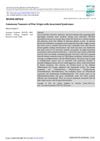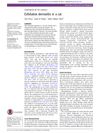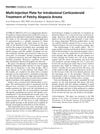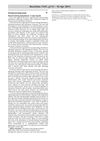 89 citations,
February 2002 in “Australasian journal of dermatology”
89 citations,
February 2002 in “Australasian journal of dermatology” A premenopausal woman had hair loss and skin issues, treated with topical steroids.
[object Object]  69 citations,
January 2015 in “Current problems in dermatology”
69 citations,
January 2015 in “Current problems in dermatology” Trichoscopy is a quick, noninvasive method to diagnose hair and scalp disorders, often reducing the need for biopsies.
 48 citations,
March 1997 in “Veterinary Dermatology”
48 citations,
March 1997 in “Veterinary Dermatology” Some cats with sudden hair loss and tiredness might have cancer-related alopecia.
 23 citations,
January 2010 in “Journal of Medical Primatology”
23 citations,
January 2010 in “Journal of Medical Primatology” Hair loss in Rhesus macaques may be caused by a skin allergy-related condition.
11 citations,
July 2018 in “AJGP” Low-dose oral minoxidil effectively reduces hair loss in women with female pattern hair loss.
 7 citations,
January 2017 in “Dermatology”
7 citations,
January 2017 in “Dermatology” People who get alopecia areata after age 50 usually have mild symptoms, high chances of hair regrowth, and often have other health conditions.
 October 2023 in “Research Review”
October 2023 in “Research Review” Some skin tumors from hair follicles and glands can be linked to genetic syndromes and may be benign or malignant.
 September 2020 in “Annals of the National Academy of Medical Sciences. India”
September 2020 in “Annals of the National Academy of Medical Sciences. India” COVID-19 can cause skin issues like "COVID toes," rashes, hair loss, and hand eczema, and dermatologists are important for recognizing these signs.
 October 2016 in “Veterinary record case reports”
October 2016 in “Veterinary record case reports” A cat had a rare skin disorder with hair loss and scaling, linked to a suspected tumor.
 April 2012 in “Informa Healthcare eBooks”
April 2012 in “Informa Healthcare eBooks” Lichen planopilaris is a rare, chronic condition causing hair loss, mainly in middle-aged women, and early treatment is important to prevent permanent baldness.
 June 2008 in “British Journal of Dermatology”
June 2008 in “British Journal of Dermatology” UK medical students lack dermatology education, liver biopsy patients with risk factors show more fibrosis, and certain fungi resist drugs due to melanin; genetics may influence female hair loss.
 35 citations,
January 2002 in “Dermatology”
35 citations,
January 2002 in “Dermatology” A woman's hair loss during treatment with specific hepatitis C drugs grew back after stopping the medication.
 57 citations,
January 2003 in “Clinical and experimental dermatology”
57 citations,
January 2003 in “Clinical and experimental dermatology” Postmenopausal frontal fibrosing alopecia is a type of hair loss in postmenopausal women that may stop on its own but has no effective treatment.
 16 citations,
July 2000 in “Dermatologic surgery”
16 citations,
July 2000 in “Dermatologic surgery” The multi-injection plate is a less painful and more efficient method for treating patchy hair loss.
 9 citations,
May 2021 in “International Journal of Dermatology”
9 citations,
May 2021 in “International Journal of Dermatology” The trial showed that a new under-the-tongue treatment for severe hair loss was somewhat effective in a small group of people.
 1 citations,
October 2008 in “Expert Review of Dermatology”
1 citations,
October 2008 in “Expert Review of Dermatology” Frontal Fibrosing Alopecia is a slowly progressing hair loss condition, likely underdiagnosed, with ineffective treatments, needing more research to understand it fully.
 3 citations,
January 2019 in “Skin appendage disorders”
3 citations,
January 2019 in “Skin appendage disorders” A woman with a rare scalp lymphoma had unusual hair loss after treatment.
 123 citations,
August 2005 in “Journal of the European Academy of Dermatology and Venereology”
123 citations,
August 2005 in “Journal of the European Academy of Dermatology and Venereology” The study found that Frontal Fibrosing Alopecia affects a broader age range of women and early treatment can help stop hair loss.

The document discusses various diseases of the outer ear, categorized by symptoms like redness, crusts, bumps, pus-filled lesions, lumps, ulcers, and hair loss.
 16 citations,
May 2011 in “Dermatologic therapy”
16 citations,
May 2011 in “Dermatologic therapy” Effective treatments for severe alopecia areata are still lacking.
 April 2016 in “Journal of The American Academy of Dermatology”
April 2016 in “Journal of The American Academy of Dermatology” The study found that severe alopecia areata affects any age, treatments often give temporary results, and some factors predict worse outcomes.
 August 2022 in “IntechOpen eBooks”
August 2022 in “IntechOpen eBooks” The best treatment for Frontal Fibrosing Alopecia and Lichen Planopilaris combines oral and topical medications to reduce symptoms and stop hair loss.
 April 2015 in “Reactions Weekly”
April 2015 in “Reactions Weekly” Some elderly men had healing problems after using imiquimod and diclofenac for skin conditions on their scalps.
 90 citations,
May 2019 in “Drugs”
90 citations,
May 2019 in “Drugs” Long-term use of azole antifungals can cause hair loss, hormonal imbalances, and severe skin reactions.
[object Object] 42 citations,
March 2015 in “Anais Brasileiros de Dermatologia” Anti-TNF therapy can cause hair loss and skin issues.
 23 citations,
August 2018 in “Anais Brasileiros De Dermatologia”
23 citations,
August 2018 in “Anais Brasileiros De Dermatologia” Both androgenetic alopecia and alopecia areata negatively impact quality of life, with no significant difference between them.
 21 citations,
April 2011 in “Epilepsia”
21 citations,
April 2011 in “Epilepsia” The drug combination significantly reduced epileptic drop attacks in patients.
 10 citations,
April 2013 in “Veterinary dermatology”
10 citations,
April 2013 in “Veterinary dermatology” A new skin disease in four Labrador retrievers responded well to immunosuppressive treatment.
1 citations,
December 2017 in “Annals of Dermatological Research” Accurate early diagnosis of Lichen Planopilaris is crucial to prevent permanent hair loss.
 January 2024 in “Brazilian Journal of Veterinary Pathology”
January 2024 in “Brazilian Journal of Veterinary Pathology” The horse had a rare disease causing weight loss and skin issues, leading to euthanasia due to poor treatment options.



























